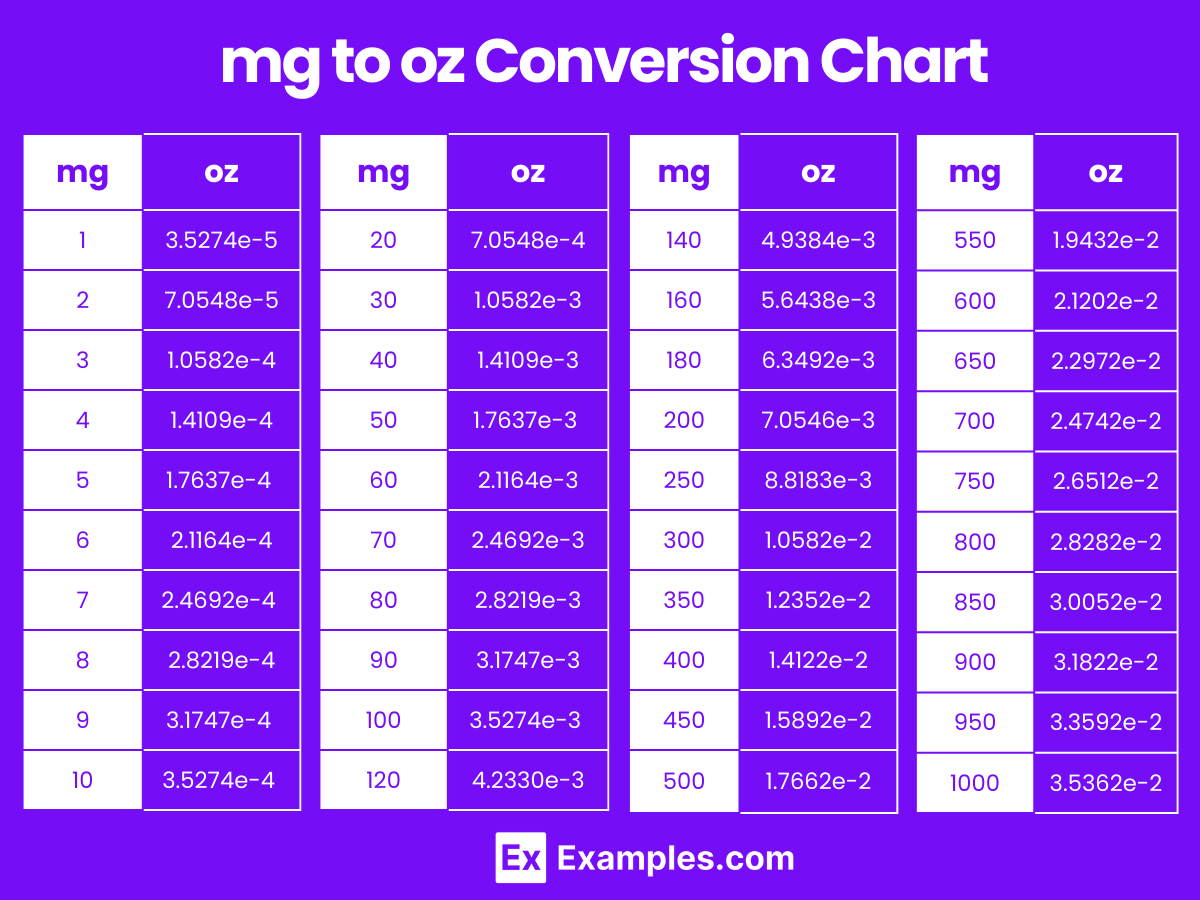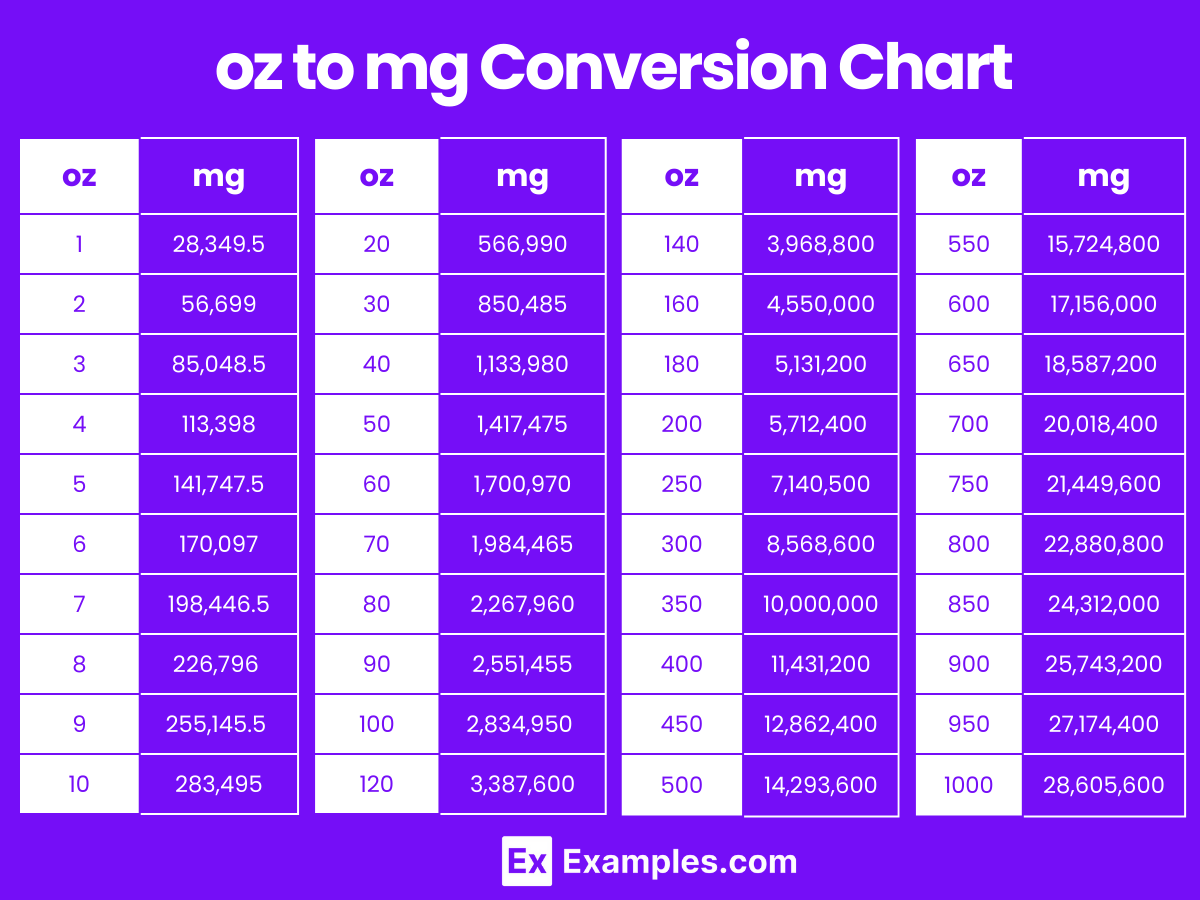Instantly transform milligrams to ounces and vice versa at Examples.com. Enjoy precise and speedy conversions with our advanced tool.
Milligram to Ounce
Formula: Mass in Ounce (oz) = Mass in Milligram (mg) × 3.527×10-5
| Milligram | Ounce |
|---|---|
| 1 | 3.5274e-5 |
Ounce to Milligram
Formula: Mass in Milligram (mg) = Mass in Ounce (oz) × 28349.5
| Ounce | Milligram |
|---|---|
| 1 | 28349.5 |
Mass Converters to Milligram (mg)
| Tonne to Milligram | Kilogram to Milligram | Gram to Milligram |
| Microgram to Milligram | Imperial ton to Milligram | US ton to Milligram |
| Stone to Milligram | Pound to Milligram | Ounce to Milligram |
Mass Converters to Ounce (oz)
| Tonne to Ounce | Kilogram to Ounce | Gram to Ounce |
| Milligram to Ounce | Microgram to Ounce | Imperial ton to Ounce |
| US ton to Ounce | Stone to Ounce | Pound to Ounce |
Conversion Factors:
- Milligrams to Ounces: 1 ounce = 28,349.5 milligrams
- Ounces to Milligrams: 1 milligram = 3.5274e-5 ounces
How to Convert Milligrams to Ounces:
To convert milligrams to ounces, multiply the number of milligrams by 3.5274e-5.
Ounces=Milligrams×3.5274e−5
Example:
Convert 5,000 milligrams to ounces.
Ounces=5,000×3.5274e−5=0.17637 ounces
How to Convert Ounces to Milligrams:
To convert ounces to milligrams, multiply the number of ounces by 28,349.5.
Milligrams=Ounces×28,349.5
Example:
Convert 4 ounces to milligrams.
Milligrams=4×28,349.5=113,398 milligrams
Milligrams to Ounces Conversion Table
| Milligrams (mg) | Ounces (oz) |
|---|---|
| 1 mg | 3.5274e-5 oz |
| 2 mg | 7.0548e-5 oz |
| 3 mg | 1.0582e-4 oz |
| 4 mg | 1.4109e-4 oz |
| 5 mg | 1.7637e-4 oz |
| 6 mg | 2.1164e-4 oz |
| 7 mg | 2.4692e-4 oz |
| 8 mg | 2.8219e-4 oz |
| 9 mg | 3.1747e-4 oz |
| 10 mg | 3.5274e-4 oz |
| 20 mg | 7.0548e-4 oz |
| 30 mg | 1.0582e-3 oz |
| 40 mg | 1.4109e-3 oz |
| 50 mg | 1.7637e-3 oz |
| 60 mg | 2.1164e-3 oz |
| 70 mg | 2.4692e-3 oz |
| 80 mg | 2.8219e-3 oz |
| 90 mg | 3.1747e-3 oz |
| 100 mg | 3.5274e-3 oz |
mg to oz Conversion Chart

Ounces to Milligrams Conversion Table
| Ounces (oz) | Milligrams (mg) |
|---|---|
| 1 oz | 28,349.5 mg |
| 2 oz | 56,699 mg |
| 3 oz | 85,048.5 mg |
| 4 oz | 113,398 mg |
| 5 oz | 141,747.5 mg |
| 6 oz | 170,097 mg |
| 7 oz | 198,446.5 mg |
| 8 oz | 226,796 mg |
| 9 oz | 255,145.5 mg |
| 10 oz | 283,495 mg |
| 20 oz | 566,990 mg |
| 30 oz | 850,485 mg |
| 40 oz | 1,133,980 mg |
| 50 oz | 1,417,475 mg |
| 60 oz | 1,700,970 mg |
| 70 oz | 1,984,465 mg |
| 80 oz | 2,267,960 mg |
| 90 oz | 2,551,455 mg |
| 100 oz | 2,834,950 mg |
oz to mg Conversion Chart

Differences Between Milligrams to Ounces
| Aspect | Milligrams (mg) | Ounces (oz) |
|---|---|---|
| Unit Type | Metric unit of mass | Imperial unit of mass |
| Conversion Factor | 1 ounce = 28,349.5 milligrams | 1 milligram = 3.5274e-5 ounces |
| Scale | Measures very small quantities | Measures larger quantities |
| Common Usage | Used in scientific, medical, and precise measurements | Commonly used for everyday and larger weight measurements |
| Size of Value | Typically involves small numbers; e.g., milligrams often in thousands or millions | Typically involves larger numbers; e.g., ounces are usually in whole numbers or fractions |
| Measurement Precision | Provides high precision for tiny measurements | Suitable for larger quantities with moderate precision |
| Unit Conversion Complexity | Requires a small conversion factor (3.5274e-5) | Requires a larger conversion factor (28,349.5) |
| Global Usage | Widely used in scientific contexts and many countries | Common in the US and UK for various weight measurements |
1. Solved Examples on Converting Milligrams to Ounces
Example 1
Problem: Convert 1,000 milligrams to ounces.
Solution: Ounces=1,000×3.5274e−5=0.035274 ounces
Example 2
Problem: Convert 5,000 milligrams to ounces.
Solution: Ounces=5,000×3.5274e−5=0.17637 ounces
Example 3
Problem: Convert 10,000 milligrams to ounces.
Solution: Ounces=10,000×3.5274e−5=0.35274 ounces
Example 4
Problem: Convert 25,000 milligrams to ounces.
Solution: Ounces=25,000×3.5274e−5=0.88185 ounces
Example 5
Problem: Convert 50,000 milligrams to ounces.
Solution: Ounces=50,000×3.5274e−5=1.7637 ounces
2. Solved Examples on Converting Ounces to Milligrams
Example 1
Problem: Convert 2 ounces to milligrams.
Solution: Milligrams=2×28,349.5=56,699 milligrams
Example 2
Problem: Convert 7 ounces to milligrams.
Solution: Milligrams=7×28,349.5=198,446.5 milligrams
Example 3
Problem: Convert 10 ounces to milligrams.
Solution: Milligrams=10×28,349.5=283,495 milligrams
Example 4
Problem: Convert 15 ounces to milligrams.
Solution: Milligrams=15×28,349.5=425,242.5 milligrams
Example 5
Problem: Convert 25 ounces to milligrams.
Solution: Milligrams=25×28,349.5=708,737.5 milligrams
Why might I need to convert milligrams to ounces?
You might need to convert milligrams to ounces when dealing with weight measurements in recipes, pharmaceuticals, or industrial processes that use different unit systems.
What is the smallest amount in milligrams that can be converted to ounces?
The smallest measurable amount in milligrams can be converted to ounces, but very small values in milligrams will result in very small decimal values in ounces.
Can milligrams be easily converted to ounces manually?
Yes, milligrams can be manually converted to ounces using the appropriate formula, but using a digital calculator is often quicker and reduces the risk of errors.
What are some common applications for milligrams to ounces conversion?
Common applications include cooking and baking where ingredient weights are needed, scientific research requiring precise measurements, and industries where both metric and imperial systems are used.
Can I use online tools for converting milligrams to ounces?
Yes, there are various online tools and calculators that can instantly convert milligrams to ounces, providing quick and accurate results for your measurements.
Are milligrams and ounces used in the same contexts?
Milligrams are typically used in scientific and medical contexts for very small quantities, while ounces are more common in everyday settings like cooking and packaging.
What are some common errors in converting milligrams to ounces?
Common errors include incorrect use of the conversion factor, misplacing decimal points, and calculation mistakes. Double-checking your work and using reliable tools can help prevent these errors.
Why is it important to convert milligrams to ounces accurately?
Accurate conversion is crucial for precise measurements in various fields such as pharmaceuticals, chemistry, and cooking, where small errors can lead to significant discrepancies.

